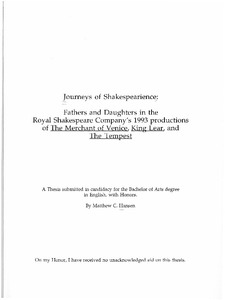| dc.rights.license | In Copyright | en_US |
| dc.creator | Hansen, Matthew Carl | |
| dc.date.accessioned | 2023-10-20T18:01:45Z | |
| dc.date.available | 2023-10-20T18:01:45Z | |
| dc.date.created | 1994 | |
| dc.identifier | WLURG038_Hansen_thesis_1994 | |
| dc.identifier.uri | https://dspace.wlu.edu/handle/11021/36545 | |
| dc.description.abstract | Three of the plays in the RSC's 1993 Stratford-upon-Avon season fortuitously fit the paradigm of a journey by exploring the journey towards maturation of fathers and daughters. These three plays are The Merchant of Venice (1597), King Lear (1604), and The Tempest (1611) [1]. In each of these plays the reader/audience watches Shakespeare's stage daughters cease to be simply their father's daughters and become wives and mothers. Their fathers, likewise on the journey to maturation, must be mature enough to handle their daughters' entry into adulthood. . . . In the first chapter, "Text," I explore the playing possibilities of Shylock and Jessica, King Lear, Goneril, Regan, and Cordelia, and Prospero and Miranda as presented in Shakespeare's texts. Each of the fathers has many roles. Shylock is a Jew, a money-lender, and a father; Lear is a king, a fool, and a father, and Prospero a Duke, magician, and father. The focus of the character and the production depends on the emphasis chosen by the individual actor and director in production. I explore the range of dramatic possibilities focusing on the paternal role of these three characters in the first chapter. . . . In the second chapter, "Context," I present the stage histories of the father/daughter dynamic, cataloging the significant cuts and interpolations of Shakespeare's text that have been made in order to emphasize Shylock, Lear, and Prospero's fatherhood. The productions I focus on represent significant
milestones in the on-stage presentation of fathers and daughters. I begin with the nineteenth century because of the pioneering efforts of William Charles Macready who, in the mid-1800's, diligently restored Shakespeare's texts to the stage rather than present the traditional Restoration adaptations. Fortuitously, Macready also began a trend with The Merchant of Venice by exploring Shylock's pathos as a father. . . . In the third and final chapter, "Realization," I discuss the details of the RSC's 1993 Stratford-upon-Avon productions of The Merchant of Venice, King Lear, and The Tempest. These three productions represent the latest development in the ongoing stage history of Shakespeare's family dynamics. All of these productions present more realistic and more human portrayals of both fathers and daughters. I examine in what ways these productions diverge from stage tradition and in what ways they maintain it, thus calling upon the details of the "Context" chapter. In general, these productions follow the overall pattern established by stage history of presenting Shakespeare's characters as progressively more credible and human. The protagonist's role as father is emphasized, and thus, both he and his daughter are presented as believably real people. [From Introduction] | en_US |
| dc.format.extent | 145 pages | en_US |
| dc.language.iso | en_US | en_US |
| dc.rights | This material is made available for use in research, teaching, and private study, pursuant to U.S. Copyright law. The user assumes full responsibility for any use of the materials, including but not limited to, infringement of copyright and publication rights of reproduced materials. Any materials used should be fully credited with the source. | en_US |
| dc.rights.uri | http://rightsstatements.org/vocab/InC/1.0/ | en_US |
| dc.subject.other | Washington and Lee University -- Honors in English | en_US |
| dc.title | Journeys of Shakespearience: Fathers and Daughters in the Royal Shakespeare Company's 1993 Productions of The Merchant of Venice, King Lear, and The Tempest | en_US |
| dc.type | Text | en_US |
| dcterms.isPartOf | WLURG038 - Student Papers | en_US |
| dc.rights.holder | Hansen, Matthew Carl | en_US |
| dc.subject.fast | Merchant of Venice (Shakespeare, William) | en_US |
| dc.subject.fast | King Lear (Shakespeare, William) | en_US |
| dc.subject.fast | Tempest (Shakespeare, William) | en_US |
| dc.subject.fast | Royal Shakespeare Company | en_US |
| dc.subject.fast | Fathers and daughters | en_US |
| local.department | English | en_US |
